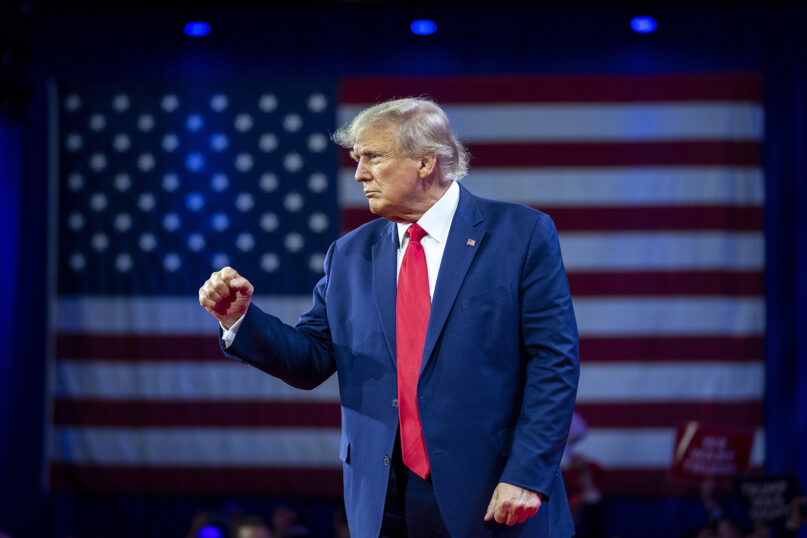(RNS) — At a time when many evangelical Christian ministers are supporting Donald Trump in his lies, the U.S. Catholic bishops are remarkably silent.
Many evangelical church services have taken on all the characteristics of a Trump rally. Preachers tell their congregations the 2020 election was stolen and that the Jan. 6 insurrection was a peaceful demonstration. They, like Trump, attack the FBI and the Department of Justice in sermons that seem drawn from Trump Republican talking points.
There is no question that the Catholic bishops supported many Trump administration policies, especially on abortion and gender issues. They wanted Catholic institutions to be free to reject birth control provisions in their employees’ health insurance coverage. They wanted to be able to fire staffers who did not support their teachings on gay marriage and other bioethical issues. They celebrated when Trump-appointed Supreme Court justices helped overturn Roe v. Wade, the decision that legalized abortion in the United States.
On the other hand the bishops publicly affirmed the 2020 election results and condemned the Jan. 6 riot.
On Nov. 7, 2020, Archbishop José H. Gomez of Los Angeles, then-president of the U.S. Conference of Catholic Bishops, said, “The American people have spoken in this election. Now is the time for our leaders to come together in a spirit of national unity and to commit themselves to dialogue and compromise for the common good.”
On behalf of the bishops, he unequivocally stated, “we recognize that Joseph R. Biden, Jr., has received enough votes to be elected the 46th President of the United States.”
Likewise, on Jan. 6, 2021, he said, “I join people of good will in condemning the violence today at the United States Capitol. This is not who we are as Americans.” He continued, “The peaceful transition of power is one of the hallmarks of this great nation. In this troubling moment, we must recommit ourselves to the values and principles of our democracy and come together as one nation under God.”
During his time in office, the bishops also were loud in their criticism of Trump’s immigration policy. They complained when federal programs for the poor were cut.
After Biden was elected, they similarly treated him according to their principles: They praised his programs helping the poor and condemned his policies on abortion.
All of this reflects the bishops’ long-standing commitment to talk about issues but not endorse candidates or political parties. You would never see Catholic bishops praying over a president for a photo op in the Oval Office.
Unlike Pat Robertson, a bishop would never think about running for political office. This is a self-imposed restriction. They have a right under the U.S. Constitution to endorse candidates and run for political office, as long as they do not use church resources.
The danger of churches becoming partisan can be seen in how it is affecting the evangelical community. Churches are being divided, causing bitter fights in congregations. People are leaving to choose churches that are more aligned with their political views. Some preach Christian nationalism; others preach traditional Christian values. Some try to be apolitical; others attack their political opponents as followers of the devil.
These churches are not divided over what they think about Jesus, rather they divide over what they think about Donald Trump.
Instead of knowing that they are Christians by their love, they are becoming known by whom they hate.
The Catholic bishops are trying to avoid these divisions. They know that their church as a whole is evenly divided among Republicans and Democrats, although local congregations tend to lean one way or the other.
Historically, as a poor minority in a Protestant nation, the Catholic bishops knew that any involvement in politics would play into the hands of anti-Catholics.
In addition, the bishops knew how the church’s involvement in European politics led to corruption and resentment. The church got too rich, and its alliance with kings and politicians led to the church sharing blame for the corruption and failures of the state. The American bishops wanted to avoid these mistakes.
The Catholic bishops have their problems. Hardly a week goes by without the bishops hearing condemnation for one reason or the other. Attorneys general issue reports on sex abuse, which describe decades of abuse and their coverup. More victims come forward to sue and then complain when dioceses declare bankruptcy. It does no good for the bishops to explain that almost all of these are old cases and that relatively few cases of abuse have occurred in the last 20 or 30 years.
Others condemn them as homophobic and patriarchal. Bishops are also attacked by Catholics who support the ordination of women and married persons. They are even accused of not supporting Pope Francis.
The bishops should be congratulated for not drinking the Trump Kool-Aid. But is silence enough? Without being sucked into partisan politics, they need to affirm that Christian nationalism is a heresy, that lying in politics is a sin against the common good and politicians are subject to the same laws as any other citizen.






